Current Schmitt Leadership Fellows
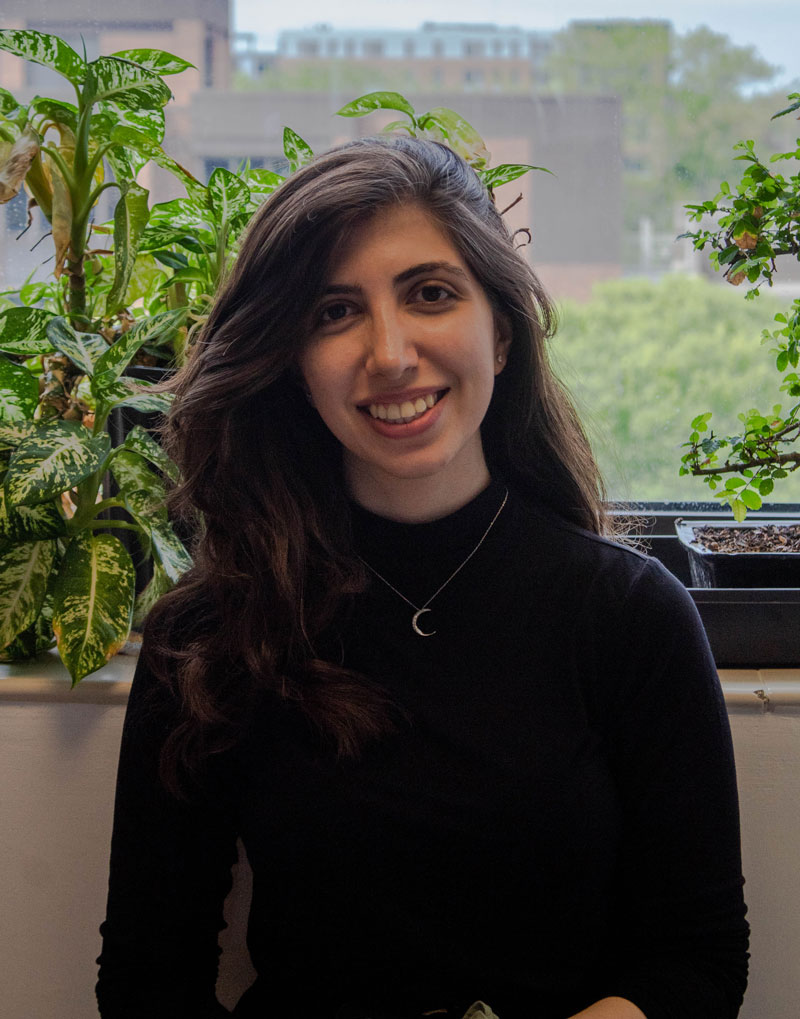 Sahar Alishiri
Sahar Alishiri
Program: Chemistry
Hometown: Tehran, Iran
Research Interests: Biochemistry
Sahar's Biography, Scholarship & Leadership
About Sahar: I grew up in Tehran, where my path into science began almost by accident. In middle school at the National Organization for Development of Exceptional Talents (NODET), I was mistakenly placed in an advanced chemistry research class. By the time the error was discovered, it was too late to change, and I was surrounded by older students pursuing independent projects. My first project—extracting glycerin from industrial soap waste—taught me resilience, curiosity, and the importance of asking questions. In high school, preparing for the Chemistry Olympiad pushed me to think critically and persevere through challenges. At the same time, I was shaped by my father, a physician who instilled a love for education, and my mother, who encouraged my artistic side. Their influence gave me a perspective that embraces both logic and creativity. During my undergraduate studies at Sharif University of Technology, I earned a degree in chemistry as well as one in dress design from a private art school, a combination that gave me a unique lens for problem-solving and innovation.
Scholarship: As an undergraduate, I explored green chemistry by studying deep eutectic solvents for plant metabolite extraction, integrating sustainability with innovation. I also discovered computational chemistry, which transformed my approach by showing me how experimental and theoretical methods could complement one another. Teaching high school chemistry alongside my research further reinforced my passion for advancing science while sharing knowledge with others. Now, as a fifth-year PhD candidate in Biochemistry, I investigate RNA–protein interactions in Dr. Nicholas Reiter’s lab. My work combines biochemical experiments with structural and computational approaches to reveal how RNA-binding proteins recognize and regulate their targets, with implications for cancer biology and therapeutic design. I use a range of techniques, from crystallography and molecular dynamics simulations to enzyme assays, to capture both the structural and functional dimensions of RNA–protein complexes.
The goal of my research is to define the molecular mechanisms that govern RNA recognition and catalysis and to identify potential vulnerabilities that could be leveraged in therapeutic strategies. Looking forward, I aim to lead interdisciplinary research programs that integrate structural biology, computational modeling, and biochemistry to address fundamental questions and develop translational solutions in human health.
Leadership:
At Marquette, I have served as both a lab manager and a mentor to younger students, fostering collaboration and creating a supportive research environment. I’ve guided new students in developing experimental skills, project design, and career planning, while also coordinating lab operations to keep projects running smoothly. These roles have strengthened my leadership, communication, and organizational abilities.
Beyond the lab, I have engaged in outreach and community involvement, helping to connect science to broader audiences. These experiences have reinforced my belief that leadership is not only about advancing one’s own work but also about creating opportunities for others to succeed.
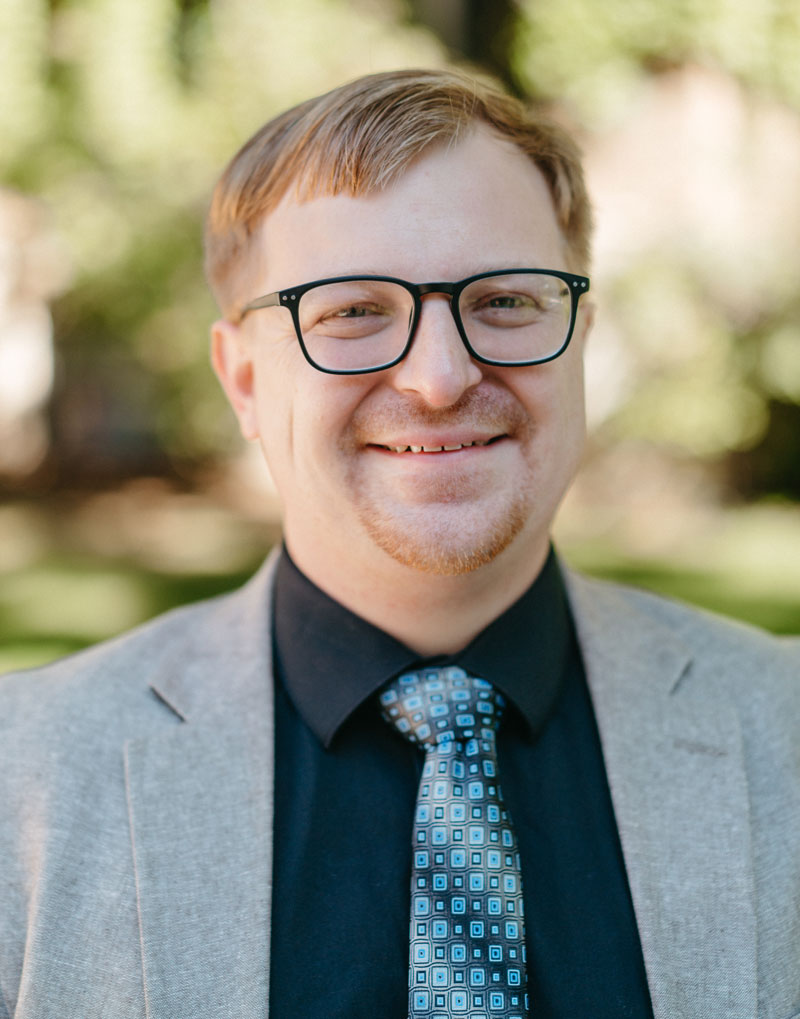
Daniel Edwards
Program: Religious Studies
Hometown: Parkersburg, WV
Research Interests: Early Christian asceticism and spirituality, Syriac and Greek monasticism
Daniel's Biography, Scholarship & Leadership
About Daniel: My presence in the doctoral program at Marquette was not something that I anticipated when I first set out on my academic journey. Growing up in a family in West Virginia that hovered around the poverty line, I was encouraged to aim for a college degree, but a “practical” one. A doctorate, in a family in which I was the first to successfully complete a bachelor's degree, was anything but. After I graduated with a four-year degree in Public Relations and moved on to pursue my Master of Divinity, I initially planned to begin a career in full-time pastoral ministry. Yet, as I studied Greek, Hebrew, Latin, the history of Christianity, and other subjects, I found myself drawn further into the life of the mind. Not only that, but I found that a doctorate was the most practical path to follow my vocation of researching the past to shape students and scholars in the present. In my free time, I enjoy hiking, playing board games, reading, and spending time with my family.
Scholarship: My area of study is historical theology. My dissertation addresses the understanding of the Holy Spirit found in a 4th century collection of texts known as the Macarian writings (written in Greek by a Syrian author). These texts present a vibrant and gripping spiritual vision which, though neglected by scholarship, was seminal for many spiritual writers. With my research, I aim to not merely expand and improve these discussions of early Christian doctrine and practice, but also to contribute to contemporary discussions of spirituality. In a time and place in which interest in spirituality is on the rise, I believe it would be beneficial to listen to ancient voices as well as more recent ones, drawing on various cultural heritages throughout the ages.
Leadership: Growing up, I have often been privileged to serve in leadership in a variety of academic and extracurricular organizations, including my high school debate team, college ministry, and others. During my time at Marquette, I have had the opportunity to sharpen my leadership skills in a variety of ways. Most formally, I served as a board member and then as co-president of the Association of Graduate Students in Theology. In this role, I shared responsibility for organizing social events for our department and leading workshops to help graduate students in earlier phases of the program complete the necessary requirements to advance. In doing so, I have assisted other students by sharing my own experiences and encouraging collaboration within our department. Even after stepping down from these roles, I have continued to be a supportive voice and presence in the program. Additionally, I have organized various events for the department, including an academic lecture and a semesterly meeting of students and professors within my field. Further, in the classroom I have led students by facilitating thoughtful conversation, in which I guide and empower them to address questions from their unique vantage points.
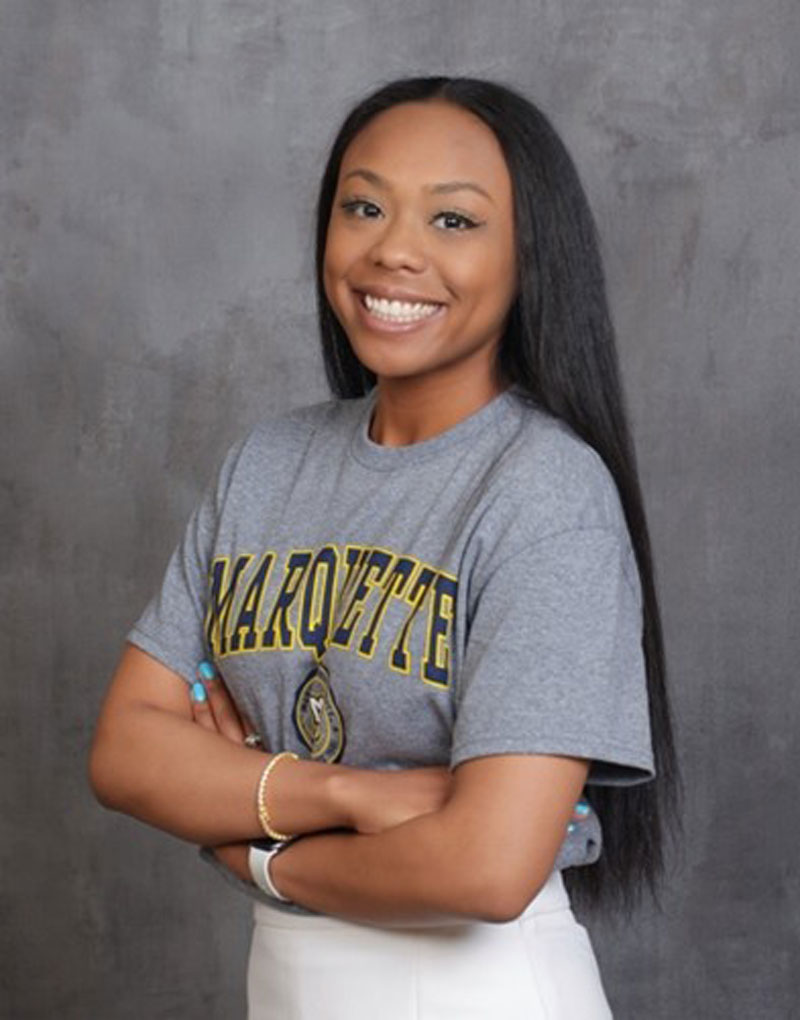 Asianna Harris
Asianna Harris
Program: Counseling Psychology
Hometown: Las Vegas, Nevada
Research Interests: Doctoral programs’ application of the scientist-practitioner model through curricula. Teaching methods that improve students’ case conceptualization abilities. Teaching methods that facilitate the development of cognitive complexity.
Asianna's Biography, Scholarship & Leadership
About Asianna: My upbringing as a Black and Asian woman in the vibrant landscape of Las Vegas, Nevada, instilled in me an appreciation for the diversity of human experience and a personal commitment to understand people through multiple lenses. My undergraduate education focus on postcolonial literature, psychology, and anthropology cultivated a holistic understanding of the human experience and an interest in case conceptualization, something that would later be one of my major research interests. Building on my scholarly foundations, I chose to pursue a master’s degree in clinical mental health counseling. Early in my master’s program, a mentor gifted me the book, The Structure of Scientific Revolutions by Thomas Kuhn. Kuhn’s book sparked my interest in the philosophy of science and postmodern schools of thought. It was pivotal in influencing me to pursue a PhD. In Marquette’s Counseling Psychology program’s history of training health psychologists. The emphasis on qualitative research, and the opportunity to work with Dr. Sarah Knox and Dr. Alan Burkard made the program an ideal fit for my academic and research goals. Throughout my doctoral studies, clinical supervisors and mentors have refined my critical thinking by challenging me to consider axiology, epistemology, and ontology—essentially, what we know, how we know it, and what we consider truth. Their guidance is what I hope to embody as a future training director and clinician educator at a medical center. Above all, I am grateful for the sacrifices my parents, grandparents, and great-grandparents have made so I could dedicate my time as a budding psychologist to research, advocacy, and helping others on their healing journeys.
Scholarship: My research focuses on the three following areas of training and education in professional psychology: (1) doctoral programs’ application of the scientist-practitioner model through curricula, (2) teaching methods that improve students’ case conceptualization abilities, and (3) teaching methods that facilitate the development of cognitive complexity. My dissertation addresses the essential clinical skill of case conceptualization, a cornerstone of practice that lacks clear pedagogical guidelines despite its centrality to effective clinical intervention. Broadly, case conceptualization is the process of making meaning of a patient’s story, identifying the etiology of their mental and emotional concerns, understanding what maintains these concerns, and determining what is needed to help them achieve wellness and healing. I hope to contribute meaningfully to the professional education literature by exploring how faculty teach and evaluate both their own teaching and the case conceptualization abilities of future psychologists. Ultimately, this research aims to improve psychologist training and foster a deeper understanding of the people we serve, including their unique narratives and sociocultural contexts.
Leadership: As modeled to me by my elders, authentic engagement with the community can reveal so much about where systems fall short and where meaningful change can begin. My commitment to community led me to work on multiple nonprofit initiatives with my family. For example, Keeping Youth Educated was a nonprofit that my family created that provided education, parenting, sports, and food resources to those in Las Vegas. Now, my family operates Beautiful Life, a community-based residential facility and adult daycare to address the lack of stable housing and behavioral health services in Las Vegas. Through these experiences, I have learned the importance of promoting dignity and radical hope in the face of adversity. Apart from my nonprofit work, my education journey has been an extension of my commitment to leadership and advocacy. Some of my most formative leadership roles included Honors College President and captain of the women’s soccer team at Johnson & Wales University. During my master’s program at the University of Nebraska-Kearney, I served as a Graduate Council Student Representative, President of the Chi Sigma Iota Counseling Honor Society, Graduate Assistant to the Black Student Association, and Student Representative for the DEI & Social Justice Committee. During my doctoral program, I served as a mentor to students in the Department of Counselor Education and Counseling Psychology, and I have contributed to Dr. Alan Burkard’s U.S. Department of Education Grant, Mental Health Service Demonstration and Training of BIPOC School Counselors. Currently, as a Tri-Chair for the American Psychological Association’s Division 17 Society for Counseling Psychology, I oversee several pillars and committees that provide learning, support, and professional development opportunities for over 700 counseling psychology students nationwide. I particularly enjoy helping fellow board members channel their passions to advance our field.
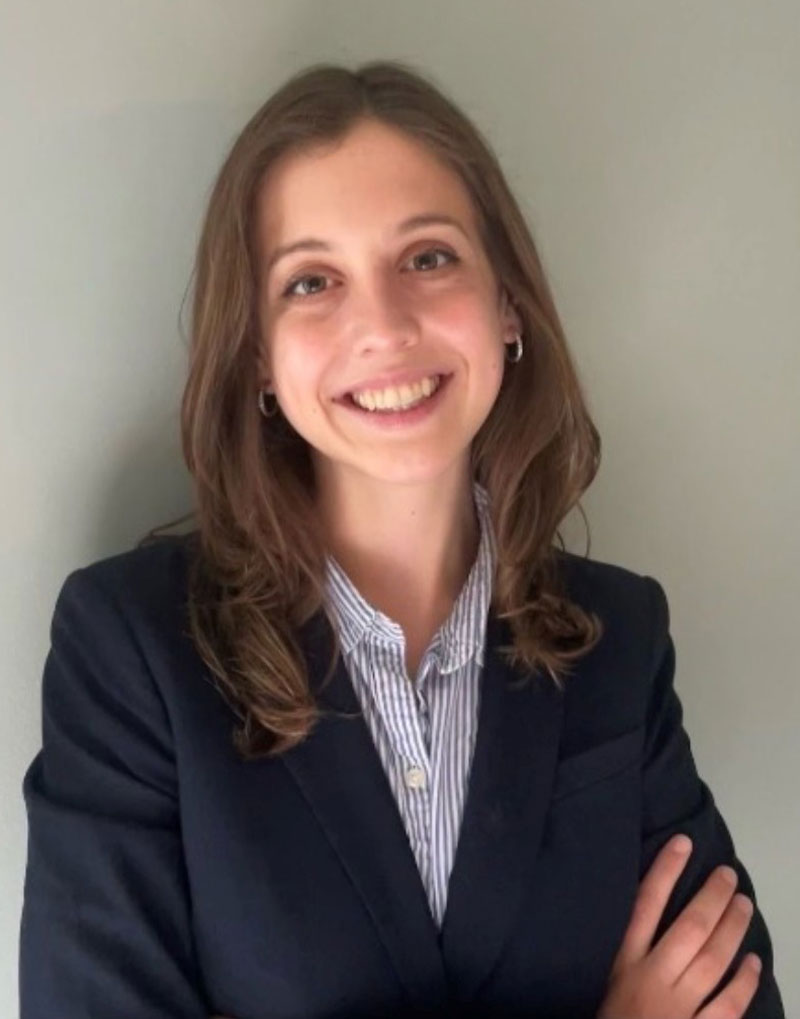
Samantha Juedemann
Program: Civil Engineering
Hometown: Boonsboro, Maryland
Research Interests: Virus inactivation, UV disinfection, Advanced Oxidation Processes, Wastewater recycling for direct potable reuse
Samantha's Biography, Scholarship & Leadership
About Samantha: As an undergrad at the University of Pittsburgh, I loved being involved with my Civil Engineering cohort, especially in Steel Bridge. However, in my classes I was learning about how climate change and aging infrastructure were impacting safe drinking water not only in Pittsburgh with combined sewer overflows, but across the country with the Flint, Michigan, water crisis taking place while I was in high school and college. I wanted my degree to enable me to take action. I was lucky to have Pitt professors who encouraged me to apply to graduate schools and to find my ideal graduate program with Environmental Engineering at Marquette University in the Water Quality Center.
Scholarship: My graduate school career began in 2020, at the height of the COVID 19 pandemic. It was only fitting to fall into laboratory work focused on virus mitigation as the topic of my dissertation research. My first research project focused on virus inactivation on surfaces (e.g., synthetic tabletops) for pandemic concerns. Using the virus culturing skills I developed in this effort, I was able to continue virus inactivation research focused on disinfection of viruses in water. My next two research efforts focused on wastewater reuse using UV light disinfection and advanced oxidation processes. This research will contribute to the ongoing effort to implement systems that can recycle wastewater effluent directly to potable drinking water, which is essential as climate change worsens water scarcity.
Leadership: I began my work on the first portion of my graduate research independently because access to the lab was limited due to the social distancing necessary in 2020. Of course, this process without a mentor involved a lot of mistakes and laboratory trial and error, and my slow progress was discouraging. Fortunately, my advisor, Dr. Brooke Mayer, exemplified the positivity, patience, and encouragement necessary to get me through my lab disappointments. From the struggles in my early lab work I learned patience, humility, and collaborative spirit necessary for effective teamwork and mentorship.
A year later, I was able to introduce new graduate students and undergraduate students to our shared research space. It was strange to be a senior laboratory researcher when I felt I was just learning myself, but this helped me recognize the importance of leaders being upfront when they do not know something, asking questions, and continuing to grow alongside others. The new graduate students and research assistants are now my greatest collaborators, and I really appreciate my virus mitigation teammates. I have also found valuable leadership practice and enjoyment as a Teaching Assistant and guest lecturer. I value both duties immensely and hope to continue to take every opportunity to improve.
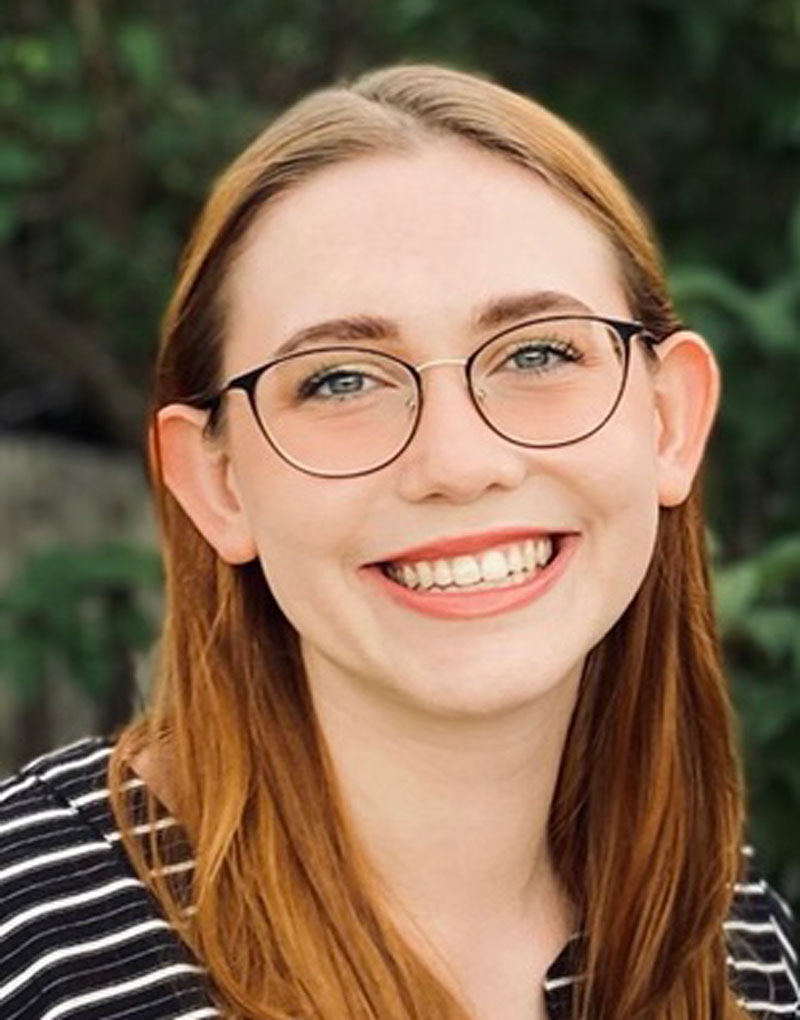 Johanna Michlig
Johanna Michlig
Program: Clinical Psychology
Hometown: Wausau, WI
Research Interests: Child and family adaptation to pediatric chronic illness, caregiver wellbeing, lived experiences of caregivers of children with medical complexity
Johanna's Biography, Scholarship & Leadership
About Johanna: I grew up in Wausau, WI, to a now-retired 5th-grade teacher and engineer. My parents instilled in me the value of education, perseverance, and the importance of community. After high school, I moved to Milwaukee to attend UW-Milwaukee with the goal of joining a research lab. I talked to the person who ran the undergraduate research program and jump-started my interest in becoming a pediatric psychologist.
Since undergrad, I have lived all over Milwaukee and currently reside in Bay View with my partner. I live right near the Oak Leaf Trail, and if I time it just right, my morning walks can lead me to the perfect view of the city. There are other things that I enjoy, beyond working and exploring Milwaukee. I brew beer with my father, read just about any genre of book, crochet, and enjoy concerts at the Cactus Club. In addition to these interests, I truly value taking a moment to appreciate the women in my life who have played a big part in shaping the person I am today. My Nana, always an advocate for what was right, and my mother, a dedicated teacher and caregiver, are the most generous people I know. Their influence drives my commitment to creating a meaningful impact in my personal and professional endeavors.
Scholarship: My doctoral research aims to identify distinct profiles of caregiver burden (i.e., the emotional, financial, social, and physical strains of caregiving) in caregivers of children with medical complexity. My work has largely focused on caregivers of children with medical complexity, their adaptation to this diagnosis, experiences with the medical system, experiences of caregiver burden, and caregiver wellbeing. My work expands upon the pediatric illness literature by focusing on an understudied group, the caregiver burden literature by critiquing the definition and applicability to children with medical complexity, and the complex care literature by utilizing a person-centered statistical approach. My goal is to integrate research findings with clinical practice to develop individually tailored interventions for families with children with medical complexity.
Leadership: Leadership, to me, is a collaborative effort that thrives by fostering community and uplifting unheard voices. In my research, I emphasize the importance of collaboration with those directly impacted by my work. For instance, my ongoing projects have been strengthened through feedback from caregivers and parent advocacy groups, ensuring that my findings are methodologically sound but also meaningful for families. Within the clinical psychology graduate program, my involvement on the graduate committee has deepened my understanding of leadership as a collective endeavor. I have gained insight into translating the needs of my peers to faculty supervisors and navigating “real-time” conversations with faculty to have those voices heard. Finally, I have been actively involved in the Society of Pediatric Psychology (SPP) through various roles. Previously, I acted as the Co-National Campus Representative for Marquette University, delivering biannual presentations to undergraduate students to raise awareness about pediatric psychology. Currently, I serve as the Trainee Representative for the Caregiver Wellbeing SIG, where I manage their social media, promote student engagement, and coordinate events for trainees interested in caregiver wellbeing. These leadership opportunities have helped me start understanding my identity as a leader and who I aspire to become.
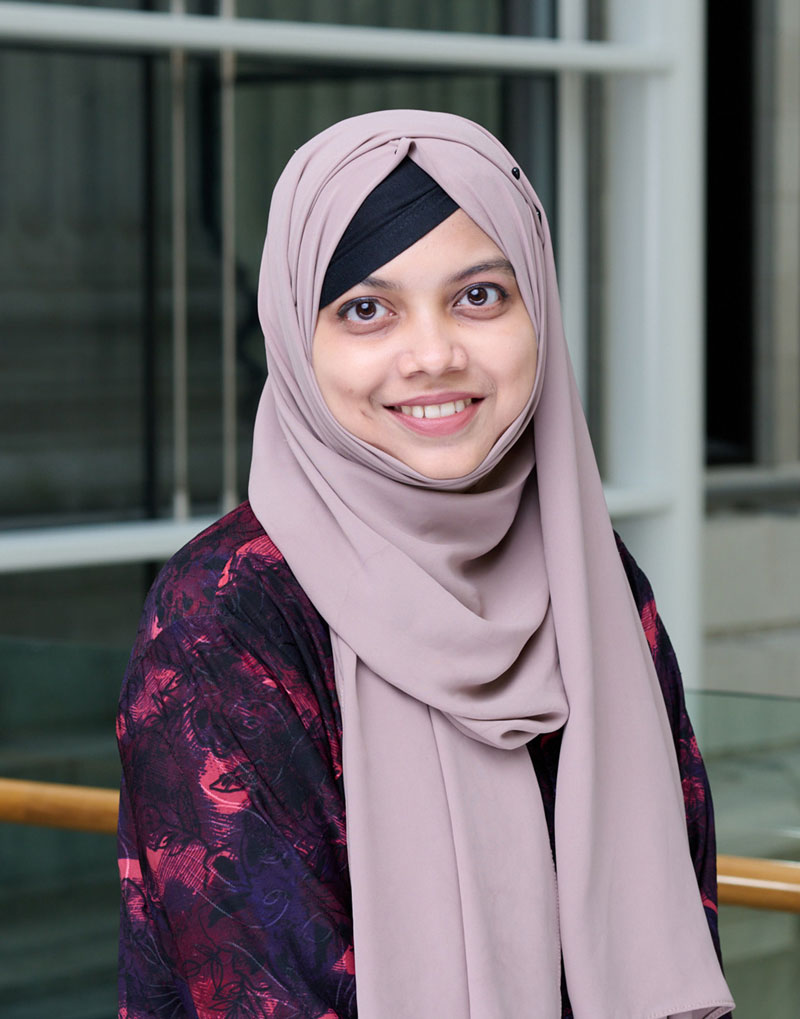 Farhat Tasnim Progga
Farhat Tasnim Progga
Program: Computer Science
Hometown: Chattogram, Bangladesh
Research interests: Human-Computer Interaction; Perinatal Mental Health and Digital Storytelling; AI-Ethics; Social Computing
Farhat's Biography, Scholarship & Leadership
About Farhat: I am from Chattogram, Bangladesh, where I grew up in a family that taught me the value of education, kindness, and perseverance. My mother, especially, has inspired me with her dedication and strength. She showed me early on that hard work and compassion can lead to meaningful change. After earning my B.Sc. in Computer Science & Engineering from North South University, I pursued my Ph.D. at Marquette University, where I am supervised by Dr. Sabirat Rubya. Under her guidance, I have deepened my research in Human-Computer Interaction, focusing on how technology can support maternal wellbeing in underserved and underrepresented communities. Witnessing the barriers that limited access to healthcare and technology created for women in Bangladesh continues to shape my commitment to this work. Outside of academics, I enjoy mentoring students, documenting, and exploring the intersection of storytelling and technology to improve people’s lives.
Scholarship: My doctoral research investigates how technology can address the mental health needs of women in the perinatal period by drawing on insights from online communities. Through large-scale data analysis of postpartum depression forums, I identified nuanced patterns of social support, misinformation, and stigma that shape mothers' experiences. These findings revealed gaps in existing systems of care and highlighted storytelling as a powerful and underexplored pathway for designing digital interventions. Guided by my advisor, Dr. Sabirat Rubya, I have translated these insights into designing interactive storytelling systems and AI-driven tools that aim to provide empathetic, culturally sensitive, and trauma-informed support. My research has been published in leading venues such as ACM CHI, CSCW, and GROUP, where it contributes to ongoing conversations in HCI about the ethical and inclusive design of digital health technologies. Recognition from awards, including ACM Best Poster, MU's Graduate School Best Poster Award, and MU's Forward Thinking Research Award, highlights this work's scholarly and social relevance. The broader implications of my research lie in demonstrating how computational methods and user-centered design can be combined to develop technologies that amplify marginalized voices, foster meaningful social connections, and expand access to mental health resources.
Leadership: Leadership, to me, is about mentoring, advocacy, and service that create space for others to succeed. At Marquette, I have led as a Teaching Assistant in data science and machine learning courses, where I help students navigate technical concepts and mentor them in developing problem-solving strategies, teamwork skills, and confidence in pursuing research opportunities. I represented graduate students as an academic senate member for the Graduate School, where I advocate for policies that promote equity, inclusion, and better academic support. In addition, I co-chaired the Northwestern Mutual Data Science Institute’s Talent Subcommittee, where I helped design initiatives that connect students with industry partners, provide professional development opportunities, and encourage diverse participation in data science. Beyond campus, I contribute to the broader research community as a peer reviewer for premier conferences such as ACM CHI and CSCW, and I regularly volunteer at academic events to support knowledge exchange and collaboration. My earlier leadership journey began at North South University, where I served as Treasurer of the IEEE Women in Engineering (WIE) Affinity Group, organizing events and initiatives to promote gender equity in STEM. These commitments have been recognized through honors such as the Grace Hopper Celebration AnitaB.org Advancing Inclusion Scholarship, which reflects my dedication to diversity and inclusion in technology. Across these experiences, I view leadership not as a title but as a responsibility to amplify marginalized voices, build inclusive communities, and ensure that the benefits of technology extend to all.
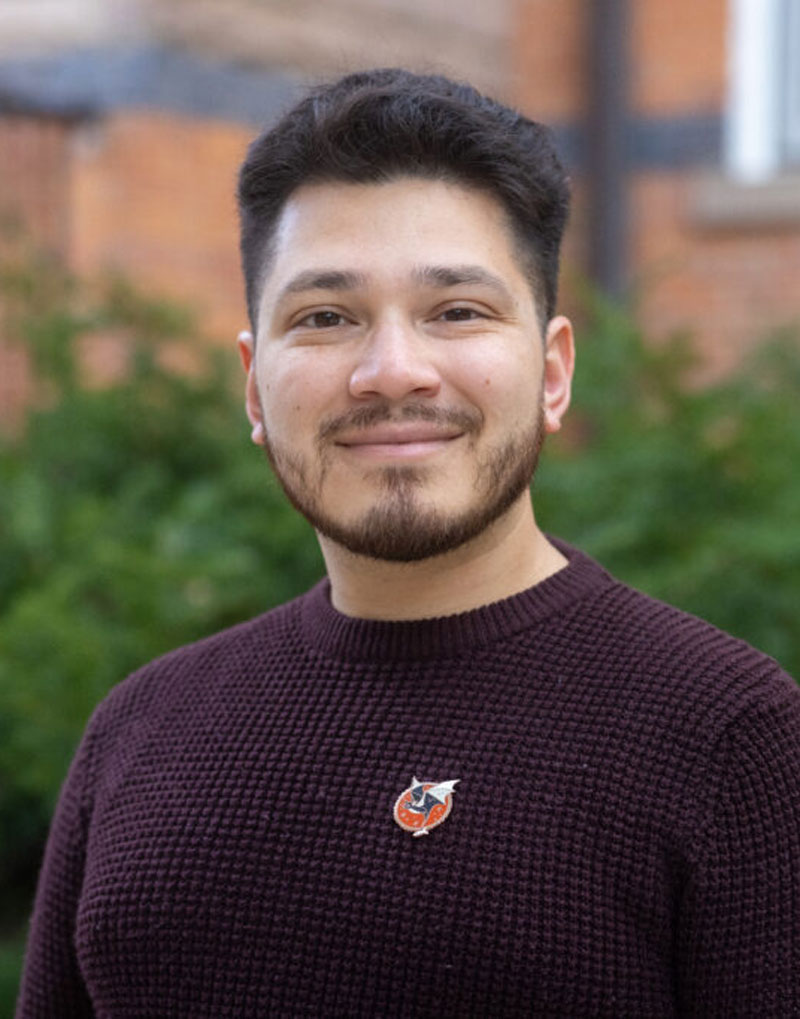 Cameron Danforth Roman
Cameron Danforth Roman
Program: Philosophy
Hometown: Milwaukee, Wisconsin
Research Interests: Political Theory, Native American Philosophy, History, Literature
Cameron's Biography, Scholarship & Leadership
About Cameron: My current research is the culmination of over a decade of academic study as well as a lifetime love of stories and storytelling. Growing up attending the Indian Community School of Milwaukee, I was surrounded by stories about my culture and learned about our history from the people who lived it. As I grew older, however, I was increasingly confronted by a broader world that sought to ascribe a predetermined identity onto me. It was during these difficult adolescent years when I had my first encounter with the philosopher W.E.B. DuBois and his concept of “double consciousness”. Experiencing DuBois’ work was my moment of coming out of the cave; it made me realize the power of philosophy to help us articulate the complexities of existence. DuBois’ work continues to inspire my own goals as a researcher and as a leader.
Scholarship: My research is currently focused on what I refer to as the “necropolitics of (dis)appearance”. This term refers to a particular kind of experience felt by Native peoples where we are at certain times made hyper-visible in Settler Colonial society and at other moments made to be invisible, depending on the stories that are being told to validate settler identity. For example, the quintessential American myth of Manifest Destiny relies on the notion of purging the land of savages, while at the same time many coming-to-America stories from Europe presuppose an empty land free for settlement. I am interested in how these kinds of myths can coexist in the American psyche and how they affect Native peoples’ perception of the world and of themselves. In keeping with traditional forms of knowledge-making, my exploration of this topic takes place in conversation with a number of fields, including political philosophy, Native studies, history, literature, and media studies.
Leadership: I believe that leadership is best expressed through the lasting positive impacts that one can leave on others. Leadership, in its ideal form, exists as part of a cyclical pattern that ensures the long-term success of a community, team, or project. It is for this reason that I identify wisdom as the most important trait for an effective leader. According to the Seven Grandfather Teachings I was raised with, wisdom refers to one’s ability to embody knowledge in a way that benefits others rather than focusing solely on personal achievement. I have done my best to practice wisdom in all of my leadership opportunities, be that as one of the elected representatives of our Marquette Philosophy Graduate Student Association, as an organizer at conferences at Marquette and Michigan State University, or as a mentor to students through my work in the Philosophy in an Inclusive Key Institute (PIKSI), Minorities and Philosophy, and the Collective of Indigenous Scholars. We often talk about leaders who kick the doors in, but many of the leaders I admire most are the ones who make sure to hold the door open for everyone else as well.
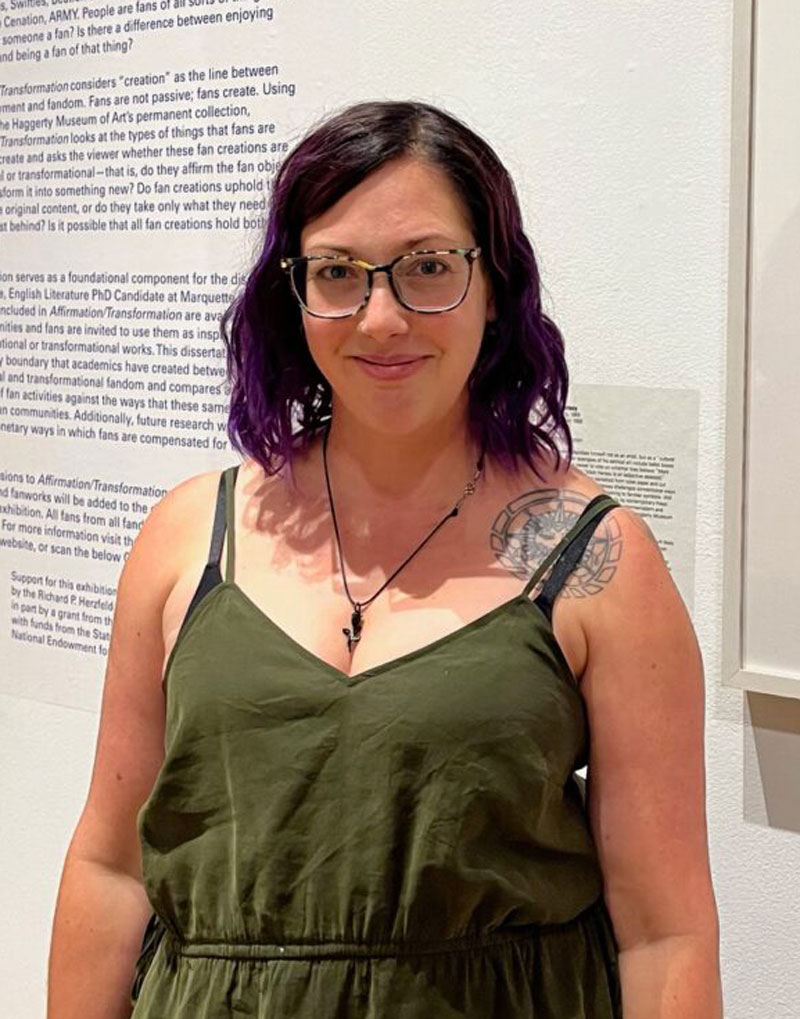 Kate Rose
Kate Rose
Program: English
Hometown: Milwaukee, Wisconsin
Research Interests: Fan Studies, Pop-Culture Studies, Gender and LGBTQ+ Studies, Public Facing Humanities
Kate's Biography, Scholarship & Leadership
About Kate: I have lived in the greater Milwaukee area my whole life, and currently reside in Bay View with my two children, my partner, two cats, a dog, and a very sassy rabbit, all of whom keep me quite busy. The birth of my first child in 2014 helped me realize the career path I had been on for 10-plus years was not what I was called to do, and I used the opportunity of being a stay-at-home-mom to earn my master's in English literature online, focusing on graphic novels. When my children began school, I continued with my PhD. When I am upset, overwhelmed, or otherwise need to escape from reality for an hour or two, I turn to fanfiction—both writing and reading. I have been writing fanfiction since well before I was familiar with the term; my middle-school friends and I filled dozens of notebooks with hand-written, self-insert Star Trek stories, creating our own spaceships and characters to inhabit the Star Trek universe. I am thankful that this was pre-internet, and that these handwritten stories did not survive through the years, as I am sure they would be extremely embarrassing to read now. Still, the memory of these stories reminds me to be extra kind when providing feedback to younger members of the fanfiction communities I belong to. I think fanfiction is a useful tool for developing writers, facilitating the expression and processing of challenging emotions, and acting as a catalyst for community. In addition to serving as a mentor in my own fan communities—through beta reading, helping with plot questions, and serving as a sensitivity reader for characters with visual impairments—I also volunteer for the Organization for Transformative Works (OTW), a non-profit that holds the mission of “serving fans by preserving and encouraging transformative fan activity.”
Scholarship: My main area of focus is fan studies, which means I study both the things that people are fans of and the fans themselves. Fandom is a concept that is often minimized or even mocked. People who engage with their fandoms “too much” or in the “wrong ways” are seen as lacking social skills or being obsessed “fanatics.” While much of the fan studies field is focused on overcoming these stereotypes, this work is mostly done through academic texts that are unapproachable or inaccessible to people outside of the field. For these reasons, I intentionally tailor my research for both academic and non-academic audiences. One example of this is Affirmation/Transformation: Fandom Created, an exhibition which was on display at Marquette's Haggerty Museum of Art from August 23rd-December 21st, 2024, and which used fine art pieces from the Haggerty’s collection to speak on the kinds of things that fans create and what those fans get in return for their creative activity. These fine art pieces were accompanied by fanworks, inspired by said fine art, and created and submitted by fans from around the world.
Leadership:
My goal as a leader is to support community and collaboration. In addition to making my work approachable, my project brought together multiple campus departments, including the English Department, Graduate School, Haggerty Museum of Art, Raynor Library, and the Institutional Repository. Collaboration is extremely important to leadership; it is not about knowing and doing everything yourself. Instead, a leader articulates a vision in a way that allows others to help achieve it. Another major factor of leadership is the courage to take risks and try new things. Using an art exhibition as the foundation of an English dissertation is something that has not been done before.
My interest in public facing humanities is an extension of my drive to be of service to my communities. In our current sociohistorical moment, the value of the humanities has diminished in the public eye. This makes it even more important to present information in a way that connects people to it—showing how and why the information is of value and encouraging further engagement. Likewise, my volunteer work at the Organization for Transformative Works (OTW) stems from the desire to be of service to a community that uplifts me and many others. On Marquette campus, I work to be of service to the community through my engagement with various groups and organizations. Currently, I serve as President of the Association of English Graduate Students (AEGS), where I have taken up the call to foster spaces for community and rest.
 Sahar Alishiri
Sahar Alishiri
 Asianna Harris
Asianna Harris
 Johanna Michlig
Johanna Michlig Farhat Tasnim Progga
Farhat Tasnim Progga Cameron Danforth Roman
Cameron Danforth Roman Kate Rose
Kate Rose
